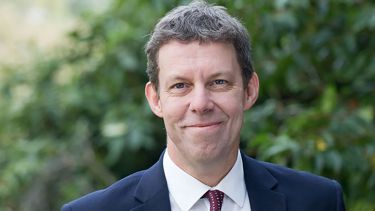The Coronavirus (COVID-19) is having an unprecedented impact across the world. For the UK, the last 10 days have been transformational and I think we can safely say that very few of us fully anticipated the range of impacts that this virus would be able to cause.
As we all try to stay safe and minimise the effect on our own lives, our loved ones, our work and our communities, I wanted to write to everyone - our partners, alumni and friends - to let you know what the University of Sheffield is doing to support the response to COVID-19.
Firstly, for those who don’t know already, the University has changed its term dates and we finished the first half of our Spring semester on Friday 20 March. In line with this, we have closed most of our University buildings, have implemented wide scale home-working and will be teaching our students online - this is explained on our website.
As one of Sheffield’s largest organisations, we are acutely aware that these changes affect many; not just our students and staff, but hundreds of suppliers and partners. Our teams have been working hard to make sure that everyone knows about the rapid changes we have made, the reasons for our actions and the ways in which we will work to support all our communities as we respond to this pandemic and, eventually, recover.
I started working and living in Sheffield around 15 months ago. Like so many before me, I have found this region to be remarkably friendly, supportive, creative and resilient. The South Yorkshire spirit is undeniable and it is instrumental in driving forward the University of Sheffield. But the coming months will be challenging for everyone, and I want you to know that the University of Sheffield is here to do all we can to support our region’s people, businesses and economy.
In the short time since COVID-19 began to spread, I have been overwhelmed by the way so many in South Yorkshire have stepped forward to help, including many of our own students and academics.
In the last two weeks, University of Sheffield scientists from our Department of Infection, Immunity and Cardiovascular Disease have worked with the Sheffield Teaching Hospitals Virology team to sequence the first two genomes of COVID-19, with samples collected from patients treated in the UK. Led by our Dr Thushan de Silva, this type of evidence helps the global science community to understand how this virus is spreading and changing, and it is this type of information that will eventually help to develop a vaccine. Dr de Silva’s team has now been asked to be part of a national consortium to sequence as many UK genomes as possible.
Other scientists in our faculty of Medicine, Dentistry and Health and beyond are also diverting their skills, laboratories and equipment to help with clinical testing. A few days ago Professor Daniel Lambert from our School of Dentistry asked his academic colleagues in Sheffield for support with NHS testing - he has told us that he has seen an extraordinary response to this request from both of Sheffield’s universities.
Supporting our Sheffield Teaching Hospitals and our NHS is at the forefront of our response to COVID-19. We know how pressed our regional workforce could become and so we have followed guidance from the Medical Schools Council to change our final assessment process and allow our final-year medical students to graduate, and begin practising, earlier than usual.
Our medical students in earlier cohorts have also been offering volunteer services to doctors, nurses and healthcare workers. Driven by the desire to help their future colleagues, they have asked healthcare workers to let them know how they can support them and have been volunteering their time on multiple tasks - from childcare to prescription collections.
The University has also made our Arts Tower car park available for medical staff free of charge and we are looking at even more creative ways to support our region’s healthcare capacity.
As part of the High Value Manufacturing Catapult, the University of Sheffield Advanced Manufacturing Research Centre (AMRC) has been involved in discussions about how the UK can quickly manufacture ventilators and other vital medical equipment.
All of these efforts are matched by countless other examples of selfless acts across South Yorkshire - students leafleting their neighbours offering support, communities sharing online activities and our public services coming together to do all they can to keep our region as safe as possible.
I also want to thank all of Sheffield’s communities for the kindness that you continue to show our students and staff who choose to make Sheffield their home. Many of our students are from different countries and some have been unable to return to their families who are thousands of miles away. Sheffield’s hospitality means everything to these students in these most testing of times.
We can’t say what South Yorkshire will look like in four, six or 12 months from now. But I intend to do my best to support our Mayor and regional leaders to help us all recover. The University of Sheffield’s founding statement explains how we were built to be ‘for the people’. And in the words of our region’s great local newspapers: we are there with you.
If you have suggestions around how the University can do more to support the response to COVID-19, please email externalrelations@sheffield.ac.uk
Professor Koen Lamberts
President and Vice-Chancellor
University of Sheffield
24 March 2020


